|
|
|
Sort Order |
|
|
|
Items / Page
|
|
|
|
|
|
|
| Srl | Item |
| 1 |
ID:
137252
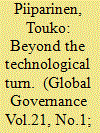

|
|
|
|
|
| Summary/Abstract |
In 2013 the United Nations applied two new peacekeeping instruments, the Intervention Brigade and unmanned aerial vehicles, in the Democratic Republic of Congo. This article argues that the significance and novelty of the Brigade and UAVs for UN peacekeeping are not only attributable to their technologically advanced and robust capacities, as maintained in previous accounts. Most importantly, these instruments also function as the harbingers of a new paradigm for peacekeeping—sovereignty building. The current technological turn of UN peacekeeping is only an epiphenomenon of a more profound paradigm shift in UN peacekeeping toward sovereignty building. Sovereignty building can be defined as an emerging set of peacekeeping practices that aims to create or reinforce four constitutive elements of sovereignty, which have previously been sidelined in state building; namely, sovereign agency (the political will of the host government), sovereign space (the area of supreme state authority), related sovereignty (the sovereignty network of subregional and regional peers), and popular sovereignty (the protection of the population).
|
|
|
|
|
|
|
|
|
|
|
|
|
|
|
|
| 2 |
ID:
137798
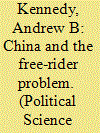

|
|
|
|
|
| Summary/Abstract |
IS CHINA PULLING ITS WEIGHT IN THE INTERNATIONAL SYSTEM? In recent years, China has increased its contribution to United Nations peacekeeping, raised its foreign aid to impoverished countries, and made significant commitments to global arms control initiatives.1 Even so, a rising chorus of voices has charged that China is “free riding” on cooperation undertaken by the United States and other countries that provides benefits to the wider international community. Calling China a free rider is nothing new; scholars described China as free riding on nuclear arms control agreements and international environmental cooperation as early as the 1990s.2 Yet with the United States beset by financial and economic woes in recent years, allegations that Beijing free rides on the United States and other countries have grown more frequent and more impatient. Whether the issue is fighting terrorism or preventing nuclear proliferation, it has become routine—particularly in the United States—to complain that China is not doing enough to support international cooperation.3 The number of articles containing both of the terms “China” and “free rider” in the Factiva database, for example, increased from an average of 39 per year from 2005 to 2009 to 75 per year from 2010 to 2013. Chinese observers, meanwhile, argue among themselves whether China free rides (da bian che) on the collective action of other states.4 Some agree that China should be seen as a free rider, at least in some areas.5 Other Chinese writers disagree and reject the notion that China should take on “even more responsibility” for global governance.
|
|
|
|
|
|
|
|
|
|
|
|
|
|
|
|
| 3 |
ID:
137133
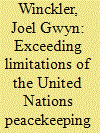

|
|
|
|
|
| Summary/Abstract |
United Nations peacekeeping is implemented by a complex bureaucratic organization, which itself can be a source of dysfunction and failure. This article empirically explores the strategies officials within the United Nations Mission in Liberia and the Department of Peacekeeping Operations apply in order to continue to do their job as effectively as possible despite the limitations of the UN peacekeeping bureaucracy. The findings demonstrate that internal acknowledgement and relevance of work are core strategic goals of UN officials. However, as the actual practices of achieving these objectives vary at different levels and locations of the UN peacekeeping bureaucracy, these strategies contribute to a significant diversity of local and decentralized decision-making frameworks rather than a rationalized effective bureaucracy.
|
|
|
|
|
|
|
|
|
|
|
|
|
|
|
|
| 4 |
ID:
137155
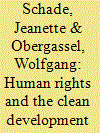

|
|
|
|
|
| Summary/Abstract |
The 2010 UN climate conference in Cancún emphasized that ‘Parties should, in all climate change related actions, fully respect human rights’. However, so far there is no further guidance. This article discusses the relevant legal human rights norms and two case studies from the Kyoto Protocol's Clean Development Mechanism (CDM). The first case (Bajo Aguán, Honduras) shows that the current absence of any international safeguards can lead to registration of highly problematic projects. The second case (Olkaria, Kenya) suggests that safeguards, introduced here as a side effect of World Bank involvement, can have a positive impact, but that it is necessary to have them based on human rights. It therefore seems recommendable that the UN climate regime develop mandatory human rights safeguards. In addition or alternatively, individual buyer countries or groups of countries, such as the European Union, could introduce their own additional requirements for CDM projects
|
|
|
|
|
|
|
|
|
|
|
|
|
|
|
|
| 5 |
ID:
137156
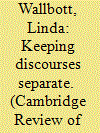

|
|
|
|
|
| Summary/Abstract |
The Alliance of Small Island States (AOSIS) encompasses more than 40 low-lying and island developing states that are among the most vulnerable but also most vocal parties in international climate negotiations. Over the years AOSIS's strategies comprised of the building of scientific expertise, and leadership by example, but also a particular framing that puts emphasis on multilateral processes to deal with issues of common concern and established principles of the international community. The initial assumption of the paper is that a frame alignment of climate change and human rights concerns would strengthen the coalition's moral and legal arguments. However, as a frame analysis of close to 50 coalition submissions and statements reveals, such a linkage is not established. The paper concludes by outlining three possible explanatory factors for this observation: the nature of the issue area, the character of the coalition and the professional background of AOSIS negotiators.
|
|
|
|
|
|
|
|
|
|
|
|
|
|
|
|
| 6 |
ID:
139220
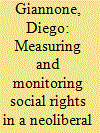

|
|
|
|
|
| Summary/Abstract |
The article aims to describe how the measurement and monitoring of human rights have been changed and weakened by the neoliberal resistance to social rights. In so doing, the study describes the political and ideological context which stimulated the broad conception of human rights included in the Universal Declaration of Human Rights. It then focuses on the ideological turn which occurred over the 1970s from welfare democracy to neoliberal democracy and the neoliberal approach to human rights. Based on a neo-Gramscian approach, the study considers political and ideological reasons as key in explaining both the rise and fall of social rights and the changes in their measurement. As a case in point, the article analyses the work of the UN in measuring and monitoring human rights. In spite of the use by the UN committees of indicators and guidelines aimed at measuring and monitoring the progressive realization of all human rights, results show that the reluctance of many states to implement social and economic rights makes UN efforts ineffective. Both states’ reluctance and instruments’ ineffectiveness can be ascribed to the neoliberal delegitimization of social rights, which is likely to persist in spite of the recent economic crisis.
|
|
|
|
|
|
|
|
|
|
|
|
|
|
|
|
| 7 |
ID:
137742
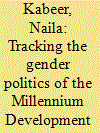

|
|
|
|
|
| Summary/Abstract |
This article tracks the gender politics of the processes that led to the adoption of the Millennium Development Goals and that continued to feature in subsequent policy debates. It suggests that this politics is rooted in tensions between conceptualisations of rights and capabilities that characterised the preceding decade. While feminist organisations made major gains on women’s rights during 1990s, it was a narrow version of human capabilities that defined the MDGs. Feminist efforts since then have focused on defending sexual and reproductive rights in the face of the attacks mounted by an ‘unholy alliance’ led by the Vatican and supported by a shifting group of countries and religious groups. This has led to the relative neglect of the economic injustices associated with the dominant market-led model of development.
|
|
|
|
|
|
|
|
|
|
|
|
|
|
|
|
|
|
|
|
|